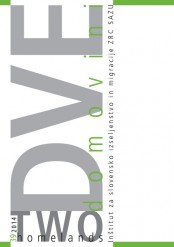Potica and Its Stories: Slovenes in Serbia and the Symbolic Significance of Food
Keywords:
food, migrations, Slovenes, Serbia, potica, identities, heritageAbstract
Food is not only a component of the material world and a means to satisfy basic physiological needs butalso plays an important role in the culture and the social life of the community. Collective preparation and consumption of food connects people, creates new relations, and strengthens the position of individuals within the community. In addition, food is an important means of differentiation that separates people according to their sex, age, and their religious, social, and ethnic affiliations. For members of different ethnic communities living in majority societies, food and food practices also represent a means of establishing and maintaining their ethnic identity. This holds true for Slovenes living in Serbia, who se ethnic affiliation is further consolidated by certain foods and dishes, such as the potica cake. Like some other elements, food shapes and impacts the lives of the members of ethnic communities, and in turnthese members participate significantly in the creation of the meaning of certain dishes, giving themnew form and content.
Downloads
References
Antill, Claire (2002). The Pie in the Folklife of New England. Food and Celebration: From Fasting to Feasting (ur. Patricia Lysaght). Ljubljana: Založba ZRC, ZRC SAZU, 409–419.
Anttonen, Pertti J. (2005). Tradition through Modernity: Postmodernism and the Nation-State in Folklore Scholarship. Helsinki: Finish Literature Society (Studia Fennica, Folklorica 15).
Bogataj, Janez (2000). Kuhinja Slovenije: Mojstrovine nove kuharske umetnosti. Ljubljana: Rokus.
Buchli, Victor (2002). Introduction. The material culture reader (ur. Victor Buchli). Oxford in New York: Berg, 1–23.
Čolakov, Nenad (2010). »Naša slovenska potica 2010«. Bilten Društvo Slovencev »Kula« Vršac, december 2010, 7.
Dawson, Andrew, Rapport, Nigel (ur.) (1998). Migrants of Identity. Oxford in New York: Berg.
Douglas, Mary (1984). Introduction. Food in the Social Order: Studies of Food and festivities in Three American Communities (ur. Mary Douglas). New York: Russel Sage Foundation, 1–39.
Douglas, Mary (1991). The idea of home: A kind of space. Social Research 58/1, 287–308.
Godina Golija, Maja (2008). Materialne sledi kulture: Prazniki in praznična miza Slovencev v 20. in 21. stoletju. Traditiones 37/2, 111–128.
Godina Golija, Maja (2012). Contemporary appropriations of culinary tradition in Slovenia. Traditiones 41/2, 91–104.
Goody, Jack R. (1982). Cooking, Cuisine and Class: A Study in Comparative Sociology. Cambridge: Cambridge University Press.
Grum, Andreja (1964). Slovenske narodne jedi. Novo mesto: Zavod za napredek gostinstva in gospodinjstva.
Levenstein, Harvey (1985). The American response to Italian food, 1880–1930. Food and Foodways 1/1, 1–24.
Lukšič Hacin, Marina, Toplak, Kristina (2012). Teoretizacija multikulturalizma in etnične ekonomije v luči ohranjanja kulturne dediščine med migranti. Dve domovini / Two Homelands 35, 107–117.
Hanson, Adelia (2006). How Lebanese Tabbouleh Salad Became an Oklahoma Dish. Mediterranean Food: Concepts and Trends (ur. Patricia Lysaght). Zagreb: Nova etnografija, 201–221.
Kirschenblatt Gimblett, Barbara (2004). Intangible Heritage as Metacultural Production. Museum International 56/221, 52–64.
Köstlin, Konrad (2010). A new Ascension of Regional Food. Food and Meals at Cultural Crossroads (ur. Patricia Lysaght). Oslo: Novus Press, 3–646.
Kuhar, Boris (1992), Prazniki in praznične jedi na Slovenskem. Ljubljana: Prešernova družba.
Makarovič, Gorazd (1991). Prehrana v 19. stoletju na Slovenskem. Slovenski etnograf 33–34/1, 127–205.
Makarovič, Gorazd (2004). Potica. Slovenski etnološki leksikon (ur. Angelos Baš). Ljubljana: Mladinska knjiga, 453.
Mennell, Stephen (1993). Prehrana i kultura: Sociologija hrane. Zagreb: Naklada Jesenski i Turk.
Milharčič Hladnik, Mirjam (2010). Hrana in spomin v kontekstu migracij. Dve domovini / Two Homelands 31, 51–63.
Mlekuž, Jernej (2010). Burekpomeni burekdarovanja neburekljudem. Dve domovini / Two Homelands 31, 65–76.
Naša slovenska potica (2013), http://www.drustvokula.org.rs/index.php?option=com_imagebrowser&v iew=gallery&folder=Nasa+slovenska+potica+2011&Itemid=2) (14. 6. 2013).
Petridou, Elia (2001). The taste of home: Home possessions. Material culture behind closed doors (ur. Daniel Miller). Oxford, New York: Berg, 87–107.
Povrzanović Frykman, Maja (2009). Material Aspects of Transnational Social Fields: An Introduction. Dve domovini / Two Homelands 29, 105–114.
Rowlands, Michael (2002). The Power of Origins: Questions of Cultural Rights. The material culture reader (ur. Victor Buchli). Oxford, New York: Berg, 105–115.
Sabo, Anica (2010). Naša slovenska potica. Bilten društva Slovencev v Beogradu – Društvo »Sava« 8/16, 9.
Schippers Thomas (2002). Od predmetov do simbolov: Spreminjajoče se perspektive pri proučevanju materialne kulture v Evropi. Etnolog 12, 125–136.
Spremo, Milena (2011). Naša slovenska potica. Letni poročevalec: Društvo Slovencev »Planika«, Zrenjanin, 34.
Sutton, David E. (2001). Remembrance of Repasts: An Anthropology of Food and Memory. Oxford, New York: Berg.
Tokarev, Sergej A. (1972). Von einigen Aufgaben der ethnographischen Erforschung der materiellen Kultur. Ethnologia Europaea 6/2, 163–178.
Žvan, Bolče (1932). Slovenci v Beogradu: Socialno-kulturna slika. Beograd: [samozaložba].
Wiegelmann, Günter (2006). Alltags und Festspeisen in Mitteleuropa: Innovationen, Strukturen und Regionen vom späten Mittelalter bis zum 20. Jahrhundert. Münster: Waxmann.
Downloads
Published
How to Cite
Issue
Section
License

This work is licensed under a Creative Commons Attribution-NonCommercial-NoDerivatives 4.0 International License.
Authors guarantee that the work is their own original creation and does not infringe any statutory or common-law copyright or any proprietary right of any third party. In case of claims by third parties, authors commit their self to defend the interests of the publisher, and shall cover any potential costs.
More in: Submission chapter





